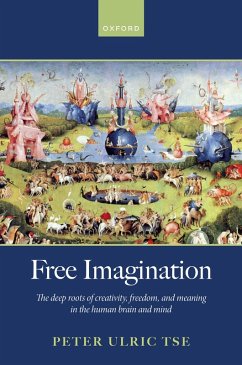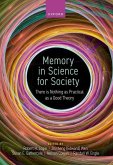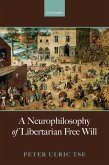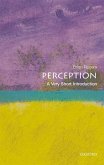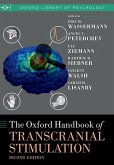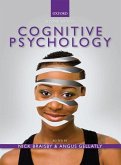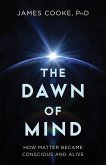Peter Ulric Tse (Chair of the Department of Psychological and Brain
Free Imagination
The Deep Roots of Creativity, Freedom and Meaning in the Human Brain and Mind
Peter Ulric Tse (Chair of the Department of Psychological and Brain
Free Imagination
The Deep Roots of Creativity, Freedom and Meaning in the Human Brain and Mind
- Gebundenes Buch
- Merkliste
- Auf die Merkliste
- Bewerten Bewerten
- Teilen
- Produkt teilen
- Produkterinnerung
- Produkterinnerung
Free Imagination argues that the brain's capacity to imagine is the fundamental basis of human Free Will. Laws of physics need not apply in our internal simulations, so virtually anything is possible there.
Andere Kunden interessierten sich auch für
![Memory in Science for Society Memory in Science for Society]() Memory in Science for Society82,99 €
Memory in Science for Society82,99 €![A Neurophilosophy of Libertarian Free Will A Neurophilosophy of Libertarian Free Will]() Prof Peter Ulric Tse (Professo Professor of Cognitive NeuroscienceA Neurophilosophy of Libertarian Free Will113,99 €
Prof Peter Ulric Tse (Professo Professor of Cognitive NeuroscienceA Neurophilosophy of Libertarian Free Will113,99 €![Oxford Guide to Behavioural Experiments in Cognitive Therapy Oxford Guide to Behavioural Experiments in Cognitive Therapy]() Khadj RoufOxford Guide to Behavioural Experiments in Cognitive Therapy83,99 €
Khadj RoufOxford Guide to Behavioural Experiments in Cognitive Therapy83,99 €![Perception Perception]() Brian Rogers (Emeritus Professor of Experimental Psychology)Perception16,99 €
Brian Rogers (Emeritus Professor of Experimental Psychology)Perception16,99 €![The Oxford Handbook of Transcranial Stimulation The Oxford Handbook of Transcranial Stimulation]() Eric WassermannThe Oxford Handbook of Transcranial Stimulation220,99 €
Eric WassermannThe Oxford Handbook of Transcranial Stimulation220,99 €![Cognitive Psychology Cognitive Psychology]() Nick BraisbyCognitive Psychology87,99 €
Nick BraisbyCognitive Psychology87,99 €![Dawn of Mind Dawn of Mind]() James CookeDawn of Mind29,99 €
James CookeDawn of Mind29,99 €-
-
-
Free Imagination argues that the brain's capacity to imagine is the fundamental basis of human Free Will. Laws of physics need not apply in our internal simulations, so virtually anything is possible there.
Produktdetails
- Produktdetails
- Verlag: Oxford University Press
- Seitenzahl: 238
- Erscheinungstermin: 22. November 2024
- Englisch
- Abmessung: 238mm x 158mm x 23mm
- Gewicht: 558g
- ISBN-13: 9780198901181
- ISBN-10: 0198901186
- Artikelnr.: 71530120
- Herstellerkennzeichnung
- Libri GmbH
- Europaallee 1
- 36244 Bad Hersfeld
- gpsr@libri.de
- Verlag: Oxford University Press
- Seitenzahl: 238
- Erscheinungstermin: 22. November 2024
- Englisch
- Abmessung: 238mm x 158mm x 23mm
- Gewicht: 558g
- ISBN-13: 9780198901181
- ISBN-10: 0198901186
- Artikelnr.: 71530120
- Herstellerkennzeichnung
- Libri GmbH
- Europaallee 1
- 36244 Bad Hersfeld
- gpsr@libri.de
Peter Ulric Tse is currently chair of the Department of Psychological and Brain Sciences at Dartmouth College in Hanover, NH, USA. He graduated from Dartmouth in 1984 with a degree in physics/mathematics. Until 1992 he lived abroad, teaching schoolchildren in Nepal, then studying philosophy at the University of Konstanz. In 1992 he began his studies in cognitive psychology at Harvard University where he received a PhD under the guidance of Patrick Cavanagh and Ken Nakayama. From 1999 until 2001 he was a post-doc in the monkey fMRI lab of Nikos Logothetis at the Max Planck Institute in Tuebingen. He has been a professor of Cognitive Neuroscience at Dartmouth since 2001.
Section 1. The Birth of our Free Imagination
1: What is imagination?
2: Human imagination is like sexual selection
3: A primer on human evolution
5: Evidence of imagination from artifacts
5: Learning from skulls
6: Mental modularity
7: What is volitional attention?
8: Symbolic thought and a premotor theory of imagination
9: Human imagination from brain demodularization
10: Analogy, Music, Abstraction and Madness from Demodularization
11: First-order and second-order desires and Free Will
12: Automatizing Good Character
Section 2. The Birth of Good and Evil in our Free Imagination
13: How should we freely choose?
14: What makes us moral beings?
15: Where does Morality come from?
16: Where does human evil come from?
17: Where does human goodness come from?
18: The Vacuum of Meaning caused by Science
19: Attempts to Fill The Vacuum of Meaning
20: The Future of Science and Religion
1: What is imagination?
2: Human imagination is like sexual selection
3: A primer on human evolution
5: Evidence of imagination from artifacts
5: Learning from skulls
6: Mental modularity
7: What is volitional attention?
8: Symbolic thought and a premotor theory of imagination
9: Human imagination from brain demodularization
10: Analogy, Music, Abstraction and Madness from Demodularization
11: First-order and second-order desires and Free Will
12: Automatizing Good Character
Section 2. The Birth of Good and Evil in our Free Imagination
13: How should we freely choose?
14: What makes us moral beings?
15: Where does Morality come from?
16: Where does human evil come from?
17: Where does human goodness come from?
18: The Vacuum of Meaning caused by Science
19: Attempts to Fill The Vacuum of Meaning
20: The Future of Science and Religion
Section 1. The Birth of our Free Imagination
1: What is imagination?
2: Human imagination is like sexual selection
3: A primer on human evolution
5: Evidence of imagination from artifacts
5: Learning from skulls
6: Mental modularity
7: What is volitional attention?
8: Symbolic thought and a premotor theory of imagination
9: Human imagination from brain demodularization
10: Analogy, Music, Abstraction and Madness from Demodularization
11: First-order and second-order desires and Free Will
12: Automatizing Good Character
Section 2. The Birth of Good and Evil in our Free Imagination
13: How should we freely choose?
14: What makes us moral beings?
15: Where does Morality come from?
16: Where does human evil come from?
17: Where does human goodness come from?
18: The Vacuum of Meaning caused by Science
19: Attempts to Fill The Vacuum of Meaning
20: The Future of Science and Religion
1: What is imagination?
2: Human imagination is like sexual selection
3: A primer on human evolution
5: Evidence of imagination from artifacts
5: Learning from skulls
6: Mental modularity
7: What is volitional attention?
8: Symbolic thought and a premotor theory of imagination
9: Human imagination from brain demodularization
10: Analogy, Music, Abstraction and Madness from Demodularization
11: First-order and second-order desires and Free Will
12: Automatizing Good Character
Section 2. The Birth of Good and Evil in our Free Imagination
13: How should we freely choose?
14: What makes us moral beings?
15: Where does Morality come from?
16: Where does human evil come from?
17: Where does human goodness come from?
18: The Vacuum of Meaning caused by Science
19: Attempts to Fill The Vacuum of Meaning
20: The Future of Science and Religion

